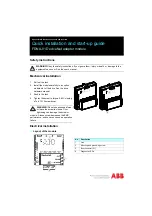
© Danfoss | DCS (MWA) | 2015.11
DKRCI.PI.HL3.A1.02 | 520H10323 | 3
ENGLISH
Installation
Refrigerants
Applicable to HCFC, HFC and R717 (Ammonia).
Flammable hydrocarbons are not recommended.
The valve is only recommended for use in
closed circuits. For further information please
contact Danfoss.
Temperature range
–60/+120°C (–76/+248°F).
Please note explicit limitations in function
modules installation guides
Pressure range
The valves are designed for a max. working
pressure of 28 bar g (406 psi g).
Important:
This pressure limitation is valid for all
covered valves in this guide despite the
function modules installation guides
statement.
Applications
All covered valves can be used in suction,
liquid, hotgas and liquid/vapor lines.
The valves regulates the flow of the medium,
modulating or on/off, depending on the actual
configuration.
Regulating range
Please refer to the regulating range of the
enclosed specific function module installation
guide
Design (fig. 7)
For more details on ordered configuration
please refer to the enclosed specific function
module installation guide
Installation
The valve must be installed with the spindle in
vertically upwards position (fig. 1).
The valve must be installed with the arrow
in the direction of the flow and the top cover
upwards. The top cover can be rotated 4 X 90°
in relation to the valve body (fig. 2).
Specific requirements for the individual
configurations must be followed. See enclosed
specific function module installation guide.
Mounting of valve flanges
• Make sure that piping into which a valve/
flange is installed is properly supported and
aligned square and plumb to the joining
sections.
• Ensure that the finalized valve assembly is free
of any stresses from external loads.
• Make certain that the mating surfaces of
gasketed joints are free of rust and are in good
condition.
• Use only new gaskets manufactured by
Danfoss.
• Make sure that the bolts are adequately
tightened in an alternating pattern.
• Ensure that flanges / valves are properly
pressure tested, leak tested, evacuated before
charging with refrigerant in accordance with
ANSI /IIAR 5, EN378-2 or ISO 5149-2.
The enclosed valves must not be mounted in
systems where the outlet side of the valve is
open to atmosphere. The outlet side of the
valve must always be connected to the system
or properly capped off, for example with a
welded-on end plate.
Silver label
Inside the valve box you’ll find a small silver
label with pressure information. Please place
this label on the top cover.
Tightening (fig. 6)
Tighten the top cover, pilot and/or external
connection with a torque wrench, to the values
indicated in the table fig 6.
Colours and identification
The valves are Zinc-Chromated from factory.
If further corrosion protection is required, the
valves can be painted.
Precise identification of the valve is made via
the ID plate on the top cover.
Protection of the ID plate when painting the
valve is recommended.
Maintenance
Service
The involved valves are easy to dismantle.
Do not open the valve while the valve is still
under pressure.
Pressure relief can be done by carefully
opening the manual operating spindle (not ICM
versions). Small grooves along the thread will
release refrigerant into open air. This operation
must only be done after providing the correct
countermeasures under local legislation.
Dismantling of the individual function modules
must be done according to fig. 3 and the more
detailed descriptions in the function module
installation guides.
Assembly
Remove any dirt from the body before the valve
is assembled. Check that all channels in the
valve are not blocked by particles or similar.
If possible, apply some refrigeration oil to ease
the insertion and to protect the o-rings.
Tightening (fig. 6)
Tighten the top cover and externals with a
torque wrench, to the values indicated in the
table.
ICM: Manual opening/closing of the
motorized ICM valve is shown in fig. 4
ICS/ICLX:
Always pay attention to the spindle during
operation of the manual opener (see fig 5a)
1. Make sure that the C-clip (C) is positioned on
the spindle (B) and is intact. A new C-clip is
available in the inspection kit for the valve.
2. Pay attention to the C-clip reaching the top
nut of the packing gland when turning the
manual stem clockwise.
Never use excessive torque and stop
turning when the C-clip gets in contact
with the top nut.
Manual opening/closing of the mechanical
valves ICS/ICLX is shown in fig 5b.
Returning to normal operating mode:
ICLX: Turn the spindle clockwise until the C-clip
gets in contact with the top nut.
ICS: Turn the spindle counterclockwise to the
top point and continue turning until a torque of
8 Nm (5.9 lb/ft) is reached.
Remount the cap and tighten it clockwise to 8
Nm (5.9 lb/ft) torque.
Use only original Danfoss parts, including
O-rings and gaskets for replacement. Materials
of new parts are certified for the relevant
refrigerant. In cases of doubt, please contact
Danfoss.
Drawings are only for illustration, not for
dimensioning or construction.
Danfoss accepts no responsibility for errors
and omissions. Danfoss Industrial Refrigeration
reserves the right to make changes to products
and specifications without prior notice.






















